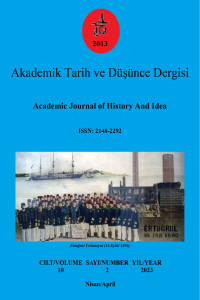On the History of Development of the Oil Industry in Northern Azerbaijan at the Crossroads of 19th and 20th Centuries
Öz
It is known that in the XIX-early XX centuries the evolution (development) of oil business in Northern Azerbaijan has come a long way. Until the early XIX century, the oil industry here was purely artisanal, but the Absheron oil fields played a significant role in the income of the khan’s treasury. Immediately after the Russian occupation in 1806, the oil fields that came under the control of the new colonial regime were handed over for ransom. The main reason for this was the backward feudal economic system of the Russian Empire, as well as the complete ignorance. However, the reforms carried out by the new owners of petrol matter after the shameful defeat in the Crimean War (1853-1856) significantly accelerated the socio-economic development of the empire, and the demand for oil increased significantly. As a result, tsarism abolished the ransom system in February 1872, and in December the oil lands were put up for auction in what looked like 'de facto private property'. In a short time, Baku oil became the main link in the imperial fuel complex, the world’s 'Oil Academy'. The rapid development of the oil industry played an important role in many areas of the socio-economic, socio-political and cultural restoration of Northern Azerbaijan.
Anahtar Kelimeler
Baku oil Romanovs Russia occupation evolution oil boom oil academy auction
On the History of Development of the Oil Industry in Northern Azerbaijan at the Crossroads of 19th and 20th Centuries
Öz
It is known that in the XIX-early XX centuries the evolution (development) of oil business in Northern Azerbaijan has come a long way. Until the early XIX century, the oil industry here was purely artisanal, but the Absheron oil fields played a significant role in the income of the khan’s treasury. Immediately after the Russian occupation in 1806, the oil fields that came under the control of the new colonial regime were handed over for ransom. The main reason for this was the backward feudal economic system of the Russian Empire, as well as the complete ignorance. However, the reforms carried out by the new owners of petrol matter after the shameful defeat in the Crimean War (1853-1856) significantly accelerated the socio-economic development of the empire, and the demand for oil increased significantly. As a result, tsarism abolished the ransom system in February 1872, and in December the oil lands were put up for auction in what looked like 'de facto private property'. In a short time, Baku oil became the main link in the imperial fuel complex, the world’s 'Oil Academy'. The rapid development of the oil industry played an important role in many areas of the socio-economic, socio-political and cultural restoration of Northern Azerbaijan.
Anahtar Kelimeler
Baku oil Romanovs Russia occupation evolution oil boom oil academy auction
Ayrıntılar
| Birincil Dil | İngilizce |
|---|---|
| Konular | Genel Türk Tarihi (Diğer) |
| Bölüm | Makaleler |
| Yazarlar | |
| Erken Görünüm Tarihi | 11 Haziran 2023 |
| Yayımlanma Tarihi | 25 Haziran 2023 |
| Kabul Tarihi | 19 Nisan 2023 |
| Yayımlandığı Sayı | Yıl 2023 Cilt: 10 Sayı: 2 |

